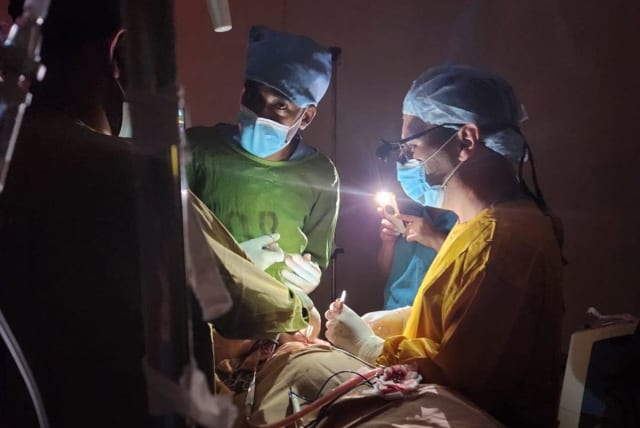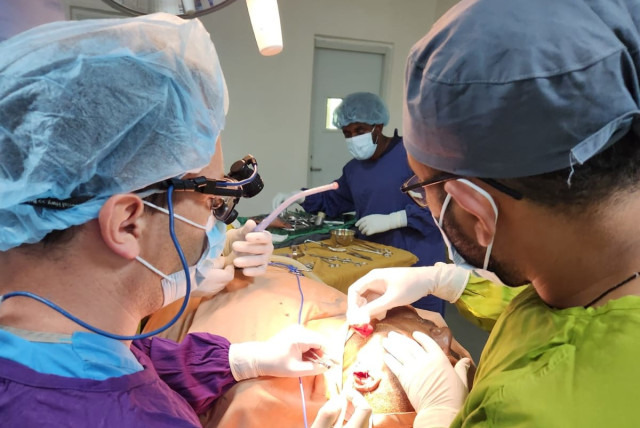Israeli doctors complete life-saving surgery in Ethiopia amid power cut

Finally, the power returned so they continued to work, and the operation ended successfully.
What happens when resourceful Israeli surgeons perform head-and-neck surgery on a three-year-old girl with a cancerous lesion in her throat in Ethiopia and all the lights go out and a backup generator fails for 15 minutes?
They pull out their smartphones and beam a surgeon’s headlamp to drive off the total darkness.
The electric ventilator also stopped working, so the Israelis with Ethiopian doctors at their side pumped air manually into the toddler’s nose.
Israel's humanitarian medical delegations to Addis Ababa
Rambam Healthcare Campus in Haifa has had a collaboration with St. Peter’s Hospital in the Ethiopian capital of Addis Ababa for a year where the hospital sends humanitarian delegations to perform certain types of surgery.
They were there three months ago and then again last week, when another delegation of volunteers from Rambam went to the Ethiopian hospital, as part of which the activity was expanded to include a head and neck surgery unit and various gynecological treatments.
The delegation included Dr. Yotam Shkedy, head of the health and neck surgery department; Dr. Vasila Racea, deputy director of the anesthesia department; Dr. Nir Haya, director of the gynecology unit; and head and neck surgery department coordinating nurse Avivit Nitka. During their stay in Addis Ababa, the team treated dozens of local patients.:
"Power outages are a fact of life in these countries,” said Shkedy, but we are used to continuing to receive the power supply from the backup systems. In this case, it didn’t happen, and we had to improvise quickly because the little girl was lying on the operating room bed in the middle of the procedure.”
In a few seconds, the operation continued in the light of Shkedy’s headlamp and the smartphone screens of everyone standing around the patient’s bed. Racea and the Ethiopian medical staffers got the ventilator to work by hand.
Finally, the power returned so they continued to work, and the operation ended successfully.
“There are many thoughts about working conditions in third-world countries when going on such missions, Shkedy noted, “but working in an operating room with no power at all never crossed my mind. Happily, we made sure that our patient’s life was not in danger as a result of the malfunction, and we finished the job properly.”
He concluded that “we have a lot of love for our profession, but getting out of the daily routine into a different reality, one that often requires thinking outside the box or performing surgery under the light of a headlamp, puts things in proportion and gives us a lot of satisfaction, especially when yet another operation is successfully completed and we can help those who need it.”
Jerusalem Post Store
`; document.getElementById("linkPremium").innerHTML = cont; var divWithLink = document.getElementById("premium-link"); if (divWithLink !== null && divWithLink !== 'undefined') { divWithLink.style.border = "solid 1px #cb0f3e"; divWithLink.style.textAlign = "center"; divWithLink.style.marginBottom = "15px"; divWithLink.style.marginTop = "15px"; divWithLink.style.width = "100%"; divWithLink.style.backgroundColor = "#122952"; divWithLink.style.color = "#ffffff"; divWithLink.style.lineHeight = "1.5"; } } (function (v, i) { });

